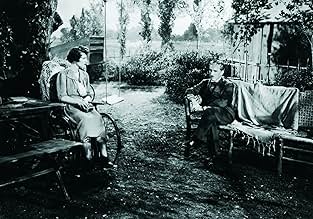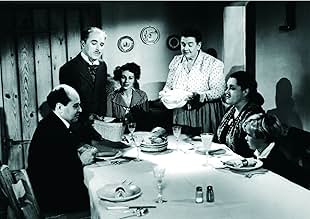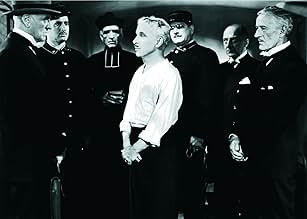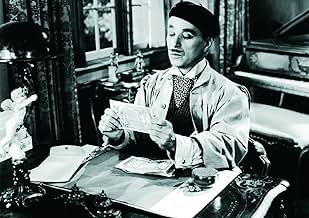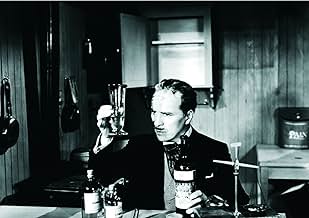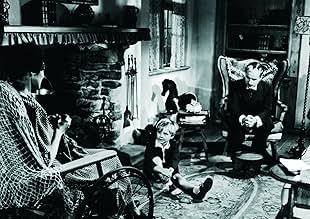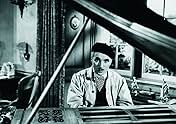A suave but cynical man supports his family by marrying and murdering rich women for their money, but the job has some occupational hazards.A suave but cynical man supports his family by marrying and murdering rich women for their money, but the job has some occupational hazards.A suave but cynical man supports his family by marrying and murdering rich women for their money, but the job has some occupational hazards.
- Director
- Writers
- Stars
- Nominated for 1 Oscar
- 6 wins & 1 nomination total
Ada May
- Annette - Her Maid
- (as Ada-May)
Bernard Nedell
- Prefect of Police
- (as Bernard J. Nedell)
- Director
- Writers
- All cast & crew
- Production, box office & more at IMDbPro
Featured reviews
... not that he made that many of them.
Chaplin plays Henri Verdoux, a man who goes about marrying and then killing upper middle class middle-aged women for their money and property. If he was known to be around at the time of their death, he disposes of their bodies in such a way that they will never be found. If he was not known to be around, then he doesn't bother to dispose of their bodies and just takes the cash he needs with him, leaving like he was never there.
It's awhile before it is revealed that Verdoux was what we now call "laid off" from his job at a bank after 30 years during the Depression that gripped Europe after WWI and as a result of that he is on a tear, married to multiple soon to be murder victims at a time, in order to provide for his actual crippled wife and child and eventually retire from this sordid business.
You never actually see Chaplin do any violence. That would just be too stunning of an image. So everything is insinuated, such as him disposing of the property of a recently deceased wife while the incinerator out back has been going full steam for three days. Martha Raye plays one of Verdoux's more annoying and lively wives, and if you think she is too good of a comedienne for Verdoux just to visit and abruptly kill her, you'd be right. His near attempts are hilariously disrupted, including one attempt that is stopped by a group of yodlers with binoculars. Will he eventually be successful? I'd say watch and find out.
In the parts of the film where Chaplin combines action, slapstick, and dialogue, the production is outstanding. At the end where he relies more on dialogue alone, I wouldn't say it drags, but I would say it is a bit "off". I get that Chaplin is trying to compare the furor that is created over the murder of a dozen people by a serial killer to society's indifference over millions dying as a result of war or famine, but I think the rather sentimental one liners he throws out blunt and muddle his message considerably.
Chaplin plays Henri Verdoux, a man who goes about marrying and then killing upper middle class middle-aged women for their money and property. If he was known to be around at the time of their death, he disposes of their bodies in such a way that they will never be found. If he was not known to be around, then he doesn't bother to dispose of their bodies and just takes the cash he needs with him, leaving like he was never there.
It's awhile before it is revealed that Verdoux was what we now call "laid off" from his job at a bank after 30 years during the Depression that gripped Europe after WWI and as a result of that he is on a tear, married to multiple soon to be murder victims at a time, in order to provide for his actual crippled wife and child and eventually retire from this sordid business.
You never actually see Chaplin do any violence. That would just be too stunning of an image. So everything is insinuated, such as him disposing of the property of a recently deceased wife while the incinerator out back has been going full steam for three days. Martha Raye plays one of Verdoux's more annoying and lively wives, and if you think she is too good of a comedienne for Verdoux just to visit and abruptly kill her, you'd be right. His near attempts are hilariously disrupted, including one attempt that is stopped by a group of yodlers with binoculars. Will he eventually be successful? I'd say watch and find out.
In the parts of the film where Chaplin combines action, slapstick, and dialogue, the production is outstanding. At the end where he relies more on dialogue alone, I wouldn't say it drags, but I would say it is a bit "off". I get that Chaplin is trying to compare the furor that is created over the murder of a dozen people by a serial killer to society's indifference over millions dying as a result of war or famine, but I think the rather sentimental one liners he throws out blunt and muddle his message considerably.
A suave but cynical man (Charles Chaplin) supports his family by marrying and murdering rich women for their money, but the job has some occupational hazards.
This film is brilliant, because it is not just entertaining, but also has a strong message. On the surface, it is a man who marries women and kills them in order to get their money. This in itself makes for a good film (and is somewhat risqué for the 1940s). But then, it is also a metaphor for society -- capitalism, imperialism, war... Chaplin takes on the Great Depression and the war industry.
Most people know Chaplin for his silent films and tramp character, but he really became a strong filmmaker in his later years. This film, along with "Great Dictator" and "King in New York" are among his best works. It is a shame that for whatever reason he is not remembered for the second half of his career.
This film is brilliant, because it is not just entertaining, but also has a strong message. On the surface, it is a man who marries women and kills them in order to get their money. This in itself makes for a good film (and is somewhat risqué for the 1940s). But then, it is also a metaphor for society -- capitalism, imperialism, war... Chaplin takes on the Great Depression and the war industry.
Most people know Chaplin for his silent films and tramp character, but he really became a strong filmmaker in his later years. This film, along with "Great Dictator" and "King in New York" are among his best works. It is a shame that for whatever reason he is not remembered for the second half of his career.
This movie is a fine example of a genre which attained enormous popularity during and in the decade after World War Two. These so-called "black comedies" (a term perhaps alluding to the funereal subject matter, ranging from fluffy (Noel Coward's "Bithe Spirit" - on stage in 1941, filmed in 1945) to darkly absurd (Ealing's "The Ladykillers" in 1955), turned death into situation comedy. Falling out of favour in the 60s, black comedy returned somewhat in the work of Robert Altman, before being brought back to full glory by the Coen Brothers.
Although the most enduringly successful example of black comedy is perhaps "Arsenic and Old Lace" (stage 1941/film 1944), two of the very greatest filmmakers blessed it with their contributions. Alfred Hitchcock to some extent incarnated the essence of it every time he introduced an episode of "Alfred Hitchcock Presents", but his definitive statement - "The Trouble with Harry" - just preceded the TV shows in 1955.
Charles Chaplin's dark vision, "Monsieur Verdoux", was released in 1947, just before the anti-Communist cries against him were to drive him out of America. A political backdrop is either entirely absent or implicit in the other examples of the genre I've mentioned, but Chaplin makes it explicit, and some might say that, to some extent, this unbalances the last reel of an otherwise utterly brilliant film. Others perhaps will be more sympathetic to the historical context. For me, while completely supporting Chaplin's observations concerning the business of war, the heavy underlining of his message does seem a flaw when viewing the film today.
All the same, "Monsieur Verdoux" is a magnificent achievement, not least in its wonderful gallery of characters, many played by character actors rarely seen on screen. Two in particular stand out, both playing wives of the much-married Verdoux: dour, unsmiling Margaret Hoffman, who goes to her death in an extraordinary scene of darkness followed by sudden light; and Martha Raye, in her best cinematic role, as the wife Verdoux fails to kill. Raye is such an explosion of energy and personality that the screen can barely contain her. To watch her and Chaplin in their scenes together is sheer joy.
The script is witty, the photography excellent, and Chaplin's penchant for sentimentality is held well in check. It is, except for the end, an unusually subtle movie, its tone completely in keeping with its French setting.
Although the most enduringly successful example of black comedy is perhaps "Arsenic and Old Lace" (stage 1941/film 1944), two of the very greatest filmmakers blessed it with their contributions. Alfred Hitchcock to some extent incarnated the essence of it every time he introduced an episode of "Alfred Hitchcock Presents", but his definitive statement - "The Trouble with Harry" - just preceded the TV shows in 1955.
Charles Chaplin's dark vision, "Monsieur Verdoux", was released in 1947, just before the anti-Communist cries against him were to drive him out of America. A political backdrop is either entirely absent or implicit in the other examples of the genre I've mentioned, but Chaplin makes it explicit, and some might say that, to some extent, this unbalances the last reel of an otherwise utterly brilliant film. Others perhaps will be more sympathetic to the historical context. For me, while completely supporting Chaplin's observations concerning the business of war, the heavy underlining of his message does seem a flaw when viewing the film today.
All the same, "Monsieur Verdoux" is a magnificent achievement, not least in its wonderful gallery of characters, many played by character actors rarely seen on screen. Two in particular stand out, both playing wives of the much-married Verdoux: dour, unsmiling Margaret Hoffman, who goes to her death in an extraordinary scene of darkness followed by sudden light; and Martha Raye, in her best cinematic role, as the wife Verdoux fails to kill. Raye is such an explosion of energy and personality that the screen can barely contain her. To watch her and Chaplin in their scenes together is sheer joy.
The script is witty, the photography excellent, and Chaplin's penchant for sentimentality is held well in check. It is, except for the end, an unusually subtle movie, its tone completely in keeping with its French setting.
Considered in some circles as Chaplin's crowning performance. It's a clever and earnest study of a man, a survivalist in a world gone the way of a corporate jungle. It also becomes incredibly relevant now in its take on the ruthlessness of capitalism and harshness of being part of a civilised society. Take allegory on its face value, Chaplin's Henri Verdoux is a bluebeard, who marries middle-aged women for their money and disposes of them through incinerators or "liquidates them" as he prefers to call it. His actions are driven by a need to care for a young child and an invalid wife who look up to him, as he keeps from them his retrenchment from his post as a bank clerk. He sees no difference in murder as he does in business. There's an inconsolable sadness throughout the film. Despite the gags, and wit teeming within its situations and characters, all roads lead to despair. The cold reach of its cynicism is daunting as it is bleak.
The film presents incongruities to the calculatingly agreeable monster by showing an aging man whose waning pride demands attention, and a hopeless romantic who surmises that he's a singular creature in a cold, inhuman world. The film then shows how arctic and precise he is when it comes to murder, how meticulous he is when he plans and how efficient he is when it comes to counting francs - cue the sight gag.
His articulation is almost borne out of being made to play different roles, the confidence he exudes to charm these women into marriage are just facets of Verdoux's intelligence. Above all, he assumes he knows how these women think and what they truly are. His misogynistic tendencies towards women who are self-sufficient is in clear contrast to his wife, who he adores and the ingénue in the street he picks up halfway through the film who restores his faith in humanity when she turns out to be an optimistic but kindred spirit.
With the film's final minutes, Chaplin indicts big business within the film's context of being in the Great Depression. He uses this opportunity to verve into anti-war criticism, a keenly placed insight being released just a few years after the end of the second World War. Insisting he's nothing but an amateur compared to the murderers behind war and business machinations, he uses the furious revolutions of the wheels of a train to show like in like many of his silents, that he's nothing but a cog - always turning to the tune of the corporations.
The film presents incongruities to the calculatingly agreeable monster by showing an aging man whose waning pride demands attention, and a hopeless romantic who surmises that he's a singular creature in a cold, inhuman world. The film then shows how arctic and precise he is when it comes to murder, how meticulous he is when he plans and how efficient he is when it comes to counting francs - cue the sight gag.
His articulation is almost borne out of being made to play different roles, the confidence he exudes to charm these women into marriage are just facets of Verdoux's intelligence. Above all, he assumes he knows how these women think and what they truly are. His misogynistic tendencies towards women who are self-sufficient is in clear contrast to his wife, who he adores and the ingénue in the street he picks up halfway through the film who restores his faith in humanity when she turns out to be an optimistic but kindred spirit.
With the film's final minutes, Chaplin indicts big business within the film's context of being in the Great Depression. He uses this opportunity to verve into anti-war criticism, a keenly placed insight being released just a few years after the end of the second World War. Insisting he's nothing but an amateur compared to the murderers behind war and business machinations, he uses the furious revolutions of the wheels of a train to show like in like many of his silents, that he's nothing but a cog - always turning to the tune of the corporations.
In his autobiography Charles Chaplin called this film his "cleverest and most brilliant" comedy, yet very few people at the time the movie was released shared this view. It was the first Chaplin US failure both with critics and audiences (though in Europe the film did quite well).
Here Chaplin plays Henri Verdoux, a serial killer who makes his living by marrying and murdering lonely reach women. Chaplin softened his character by making him a lifelong bank clerk who was laid off at the age when it was already too late to start life anew, meanwhile he has a family to support (a small son and an invalid wife). He's caught and put to trial where he accuses a hypocritical society of sanctioned mass murders and describes himself as an amateur in the field. Originally the idea belonged to Orson Welles who wanted to make a movie based on the story of a notorious murderer Henri Landru, a Frenchman who was executed in 1922 for murdering 8 women. Welles asked Chaplin to star in his film but the latter refused as he thought it was too late for him to play in a movie directed by someone else. But he bought the original idea from Welles and made what could have been a detective story or a thriller into a black comedy. It was certainly provocative and its sarcastic and ironic gravity was astonishing for the time. There is a scene, for instance, when Verdoux while waiting for the execution, talks to a journalist and pronounces the words that still fill me with horror (as they are as true nowadays as they had been fifty years ago):"Wars, conflicts - it's all business. One murder makes a villain; millions a hero. Numbers sanctify." Yet "Monsieur Verdoux" which is generally known as the most pessimistic of Chaplin films is not devoided of humour. On the contrary, at some moments it's extraordinary funny: take for instance the famous scenes with his "wives" (Annabella or Lydia)or those with madam Grosnay (my favourite bit is when Verdoux is talking to her from a flower shop, the look at the flower girl's face is wonderful!). I believe the film is one of the best I've ever seen and I highly recommend it to everyone.
Here Chaplin plays Henri Verdoux, a serial killer who makes his living by marrying and murdering lonely reach women. Chaplin softened his character by making him a lifelong bank clerk who was laid off at the age when it was already too late to start life anew, meanwhile he has a family to support (a small son and an invalid wife). He's caught and put to trial where he accuses a hypocritical society of sanctioned mass murders and describes himself as an amateur in the field. Originally the idea belonged to Orson Welles who wanted to make a movie based on the story of a notorious murderer Henri Landru, a Frenchman who was executed in 1922 for murdering 8 women. Welles asked Chaplin to star in his film but the latter refused as he thought it was too late for him to play in a movie directed by someone else. But he bought the original idea from Welles and made what could have been a detective story or a thriller into a black comedy. It was certainly provocative and its sarcastic and ironic gravity was astonishing for the time. There is a scene, for instance, when Verdoux while waiting for the execution, talks to a journalist and pronounces the words that still fill me with horror (as they are as true nowadays as they had been fifty years ago):"Wars, conflicts - it's all business. One murder makes a villain; millions a hero. Numbers sanctify." Yet "Monsieur Verdoux" which is generally known as the most pessimistic of Chaplin films is not devoided of humour. On the contrary, at some moments it's extraordinary funny: take for instance the famous scenes with his "wives" (Annabella or Lydia)or those with madam Grosnay (my favourite bit is when Verdoux is talking to her from a flower shop, the look at the flower girl's face is wonderful!). I believe the film is one of the best I've ever seen and I highly recommend it to everyone.
Did you know
- TriviaBased on real-life convicted French murderer Henri Désiré Landru, who was executed by guillotine in 1922.
- GoofsAlthough the story takes place in the years 1932-1937, all the women's fashions and hairstyles are of the 1946-1947 styles, when the film was made.
- Quotes
Henri Verdoux: Wars, conflict - it's all business. One murder makes a villain; millions, a hero. Numbers sanctify, my good fellow!
- Alternate versionsThe West German theatrical version was cut by approximately 15 minutes.
- ConnectionsFeatured in Shallow Hal (2001)
- How long is Monsieur Verdoux?Powered by Alexa
Details
- Release date
- Country of origin
- Official sites
- Languages
- Also known as
- A Comedy of Murders
- Filming locations
- Production company
- See more company credits at IMDbPro
Box office
- Budget
- $2,000,000 (estimated)
- Gross US & Canada
- $64,636
- Gross worldwide
- $65,718
- Runtime
- 2h 4m(124 min)
- Color
- Aspect ratio
- 1.37 : 1
Contribute to this page
Suggest an edit or add missing content


